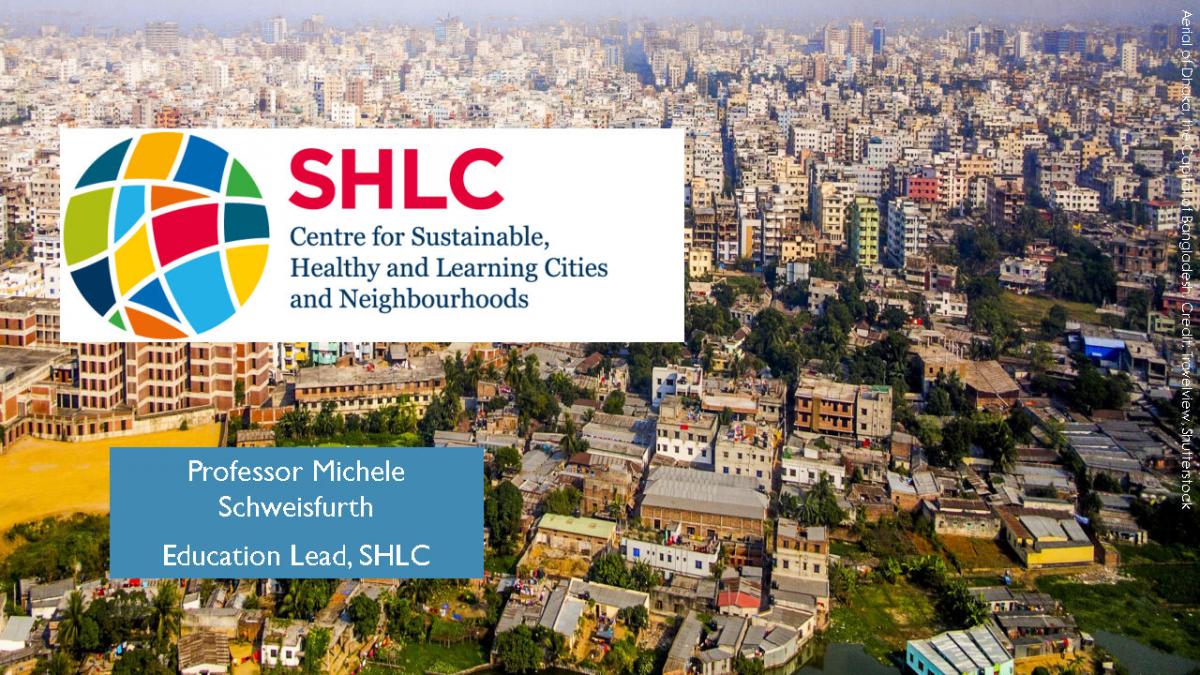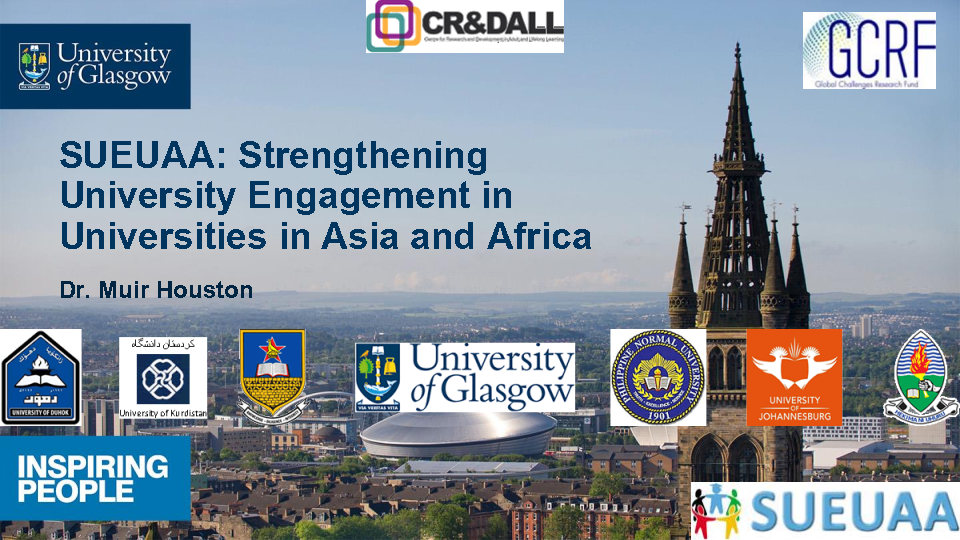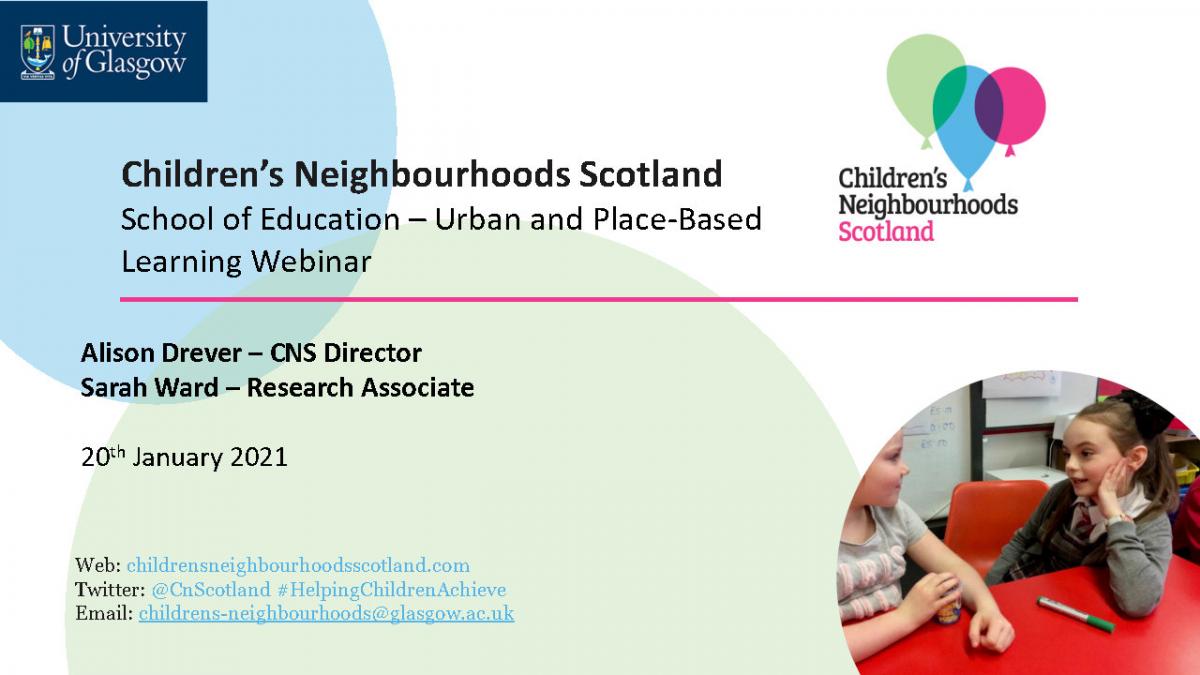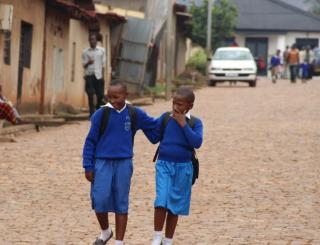Dr Muir Houston, Deputy Director of CR&DALL opened the webinar and provided an overview of logistics for the 80+ delegates and panellists. Professor Michael Osborne, Director of Research in the School of Education, began formal proceedings and introduced Professor Margery McMahon, Head of School, who welcomed delegates. Professor Osborne then explained that in this webinar with its theme of Urban and Place Based Learning, we would be hearing from representatives of four of the school’s major projects in this area, some very local to the city of Glasgow and others that involved cities and neighbourhoods in the global south.
He explained that this focus on cities reflects rapid and accelerating urbanisation, and the associated challenges of poverty, crime, environmental risks, poor health and inequitable access to learning. He suggested that a recognition that learning, living productive lives and inclusion are intimately connected requires localised initiatives and joined-up policy initiatives that recognise the heterogeneity of cities. As a result, some of the place-based initiatives presented within the webinar would focus on neighbourhoods. He pointed out the special nature of the day with the inauguration of the new President of the United States, who wife, the First Lady, Dr Jill Biden, is a teacher with a doctorate in Education. This provides for us some hope that things can change, and it was also important to note that a few days it would be UNESCO International Day of Education on 24 January.
Centre for Sustainable, Healthy, Learning Cities and Neighbourhoods
 In her role of as Education lead and Co-I, Professor Michele Schweisfurth presented the work of the Centre for Sustainable, Healthy, Learning Cities and Neighbourhoods (SHLC), a large-scale funded by UKRI within the Global Challenges Research Fund. She highlighted its twin functions of capacity strengthening and undertaking inter-disciplinary research working with researchers in seven global south countries and in 14 cities. She explained why interdisciplinary is important in the studies of urban sustainability and provided a number of examples of specific issues and research questions pertaining to education in this context.
In her role of as Education lead and Co-I, Professor Michele Schweisfurth presented the work of the Centre for Sustainable, Healthy, Learning Cities and Neighbourhoods (SHLC), a large-scale funded by UKRI within the Global Challenges Research Fund. She highlighted its twin functions of capacity strengthening and undertaking inter-disciplinary research working with researchers in seven global south countries and in 14 cities. She explained why interdisciplinary is important in the studies of urban sustainability and provided a number of examples of specific issues and research questions pertaining to education in this context.
Presentation: SHLC
Strengthening Urban Engagement of Universities in Asia and Africa (SUEUAA)
 Dr Muir Houston, Co-I within the British Academy funded GCRF project, Strengthening Urban Engagement of Universities in Asia and Africa (SUEUAA) presented an account of the work of that project as it related to cities and infrastructure. He focused on the different ways in which universities engaged with their urban communities, and how they contribute to developing sustainable cities in the context of the major social, cultural, environmental and economic challenges facing the global south. He described the various methods used in the study undertaken in six global south countries and focused on the main themes of the project: migration; environment; economy; health; and policy.
Dr Muir Houston, Co-I within the British Academy funded GCRF project, Strengthening Urban Engagement of Universities in Asia and Africa (SUEUAA) presented an account of the work of that project as it related to cities and infrastructure. He focused on the different ways in which universities engaged with their urban communities, and how they contribute to developing sustainable cities in the context of the major social, cultural, environmental and economic challenges facing the global south. He described the various methods used in the study undertaken in six global south countries and focused on the main themes of the project: migration; environment; economy; health; and policy.
Presentation: SUEUAA
Children’s Neighbourhoods Scotland (CNS)
 Dr Alison Drever, CNS Director and Dr Sarah Ward, Research Associate in CNS researchers in Children’s Neighbourhoods Scotland spoke to the work of this project funded by the Scottish Government as well as public and private, and which is working in high poverty neighbourhoods to improve outcomes for children and young people. They described the themes and work strands of the project with a particular emphasis on the role of children’s own voices in decision-making. The uniqueness of the CNS model lies in dialogue, the use of creative arts and games, its multi-dimensional approach, its scalability and it focus on a youth-led well-being framework and action plan. They also described the work of CNS in the context of the impact of COVID-19 on families, children and young people in Glasgow, and concluded with a brief account of the impacts of the work.
Dr Alison Drever, CNS Director and Dr Sarah Ward, Research Associate in CNS researchers in Children’s Neighbourhoods Scotland spoke to the work of this project funded by the Scottish Government as well as public and private, and which is working in high poverty neighbourhoods to improve outcomes for children and young people. They described the themes and work strands of the project with a particular emphasis on the role of children’s own voices in decision-making. The uniqueness of the CNS model lies in dialogue, the use of creative arts and games, its multi-dimensional approach, its scalability and it focus on a youth-led well-being framework and action plan. They also described the work of CNS in the context of the impact of COVID-19 on families, children and young people in Glasgow, and concluded with a brief account of the impacts of the work.
Presentation: CNS
Urban Big Data Centre
 Professor Catherine Lido, Associate Director and Dr Phil Mason, Research Fellow in the Urban Big Data Centre funded by the ESRC, spoke about the workstream of the centre that uses big and novel data to meet social challenges related to educational disadvantage and place. Following an overview of the objectives of this strand of work, they outlined this work as it pertained to secondary, vocational and higher education, and to learning cities. They described a particular piece of work, the Integrated Multimedia City Data (iMCD) Project, and its use of novel methodologies, such as travel diaries, GPS, lifelogging cameras and social media capture. They continued with an example of follow-on work with families in the field of lifewide literacies, and an example of rapid-response work related to COVID-19 undertaken by a PhD student, Barry Black.
Professor Catherine Lido, Associate Director and Dr Phil Mason, Research Fellow in the Urban Big Data Centre funded by the ESRC, spoke about the workstream of the centre that uses big and novel data to meet social challenges related to educational disadvantage and place. Following an overview of the objectives of this strand of work, they outlined this work as it pertained to secondary, vocational and higher education, and to learning cities. They described a particular piece of work, the Integrated Multimedia City Data (iMCD) Project, and its use of novel methodologies, such as travel diaries, GPS, lifelogging cameras and social media capture. They continued with an example of follow-on work with families in the field of lifewide literacies, and an example of rapid-response work related to COVID-19 undertaken by a PhD student, Barry Black.
Presentation: UBDC
To view a recording of the Webinar, click this link or the image below:
Panel Responses
Dr Shilpi Roy, in-Country Lead of the Centre for Sustainable, Healthy and Learning Cities and Neighbourhoods (SHLC) in Bangladesh and Professor Charles Nherera from the University of Zimbabwe and a collaborator in Strengthening Urban Engagement of Universities in Asia and Africa (SUEUAA) provided some initial responses to the presenters. Professor Nherera emphasised the benefits of collaboration with partners from other countries in SUEUAA, and the lasting legacy that the work has left in the city of Harare. He also mentioned the ways in which the project had allowed an increased focus on working with communities. Likewise, Dr Roy spoke to the benefits of international collaboration. She also emphasised the importance of the focus of education in SHLC, something largely neglected in urban research, and in governance mechanisms in particular. She described in some detail the importance of the focus on neighbourhood, and differences in terms of educational attainment found in different parts of Khulna and Dacca.
Questions to Panellists and Respondents
A number of questions were posed by delegated, some of which were posed to panellists and respondents
What is the most important thing that you have learned to date in your project and has anything surprised you?
Professor Catherine Lido from the Urban Big Data Centre mentioned that the first thing she has learned is to blur the distinction between qualitative and quantitative evaluation because it is very important to open our minds to the different languages of disciplines to better understand the work conducted by all stakeholders. Dr Phil Mason added that discovering the enormous potential of big data had surprised him, especially when it comes to speed at which technology is evolving. Since he first started at UBDC things have moved on extremely quickly and that has been very exciting for him.
Dr Sarah Ward from Children’s Neighbourhoods Scotland mentioned that understanding the motivation of young people in low-income neighbourhoods to make a change and not being able to raise their voices due to institutional barriers had been very important for her. At the same time, the level of awareness and experience that children in deprived neighbourhoods demonstrate and the understanding they have of their needs has surprised her deeply.
Professor Charles Nherera suggested that the most important thing he has learnt related to the power of interdisciplinarity in research. This enriches the scope of research throughout the involvement of different actors with diverse backgrounds.
Dr Muir Houston highlighted the importance of collaborations in the networks with researchers from all over the world that share vision and experience towards common goals. He has realised that solid partnerships and true collaboration can strengthen the effectiveness of research projects.
Dr Shilpi Roy mentioned the importance of connecting policy-making and research findings because these areas are often disconnected. In her own opinion, it is important that we reach out to policymakers, and we share what we have got as researchers.
Professor Michele Schweisfurth mentioned that there are so many ways to think about the conceptualisation of a neighbourhood. For instance, some colleagues in South Africa have been using machine learning to develop maps of neighbourhoods based on their different characteristics, which have nothing to do with any administrative boundaries or conventional maps. She is amazed by the power of cities as places that offer opportunities to people, even people who are living in some of the poorest areas, are beneficiaries of these opportunities.
How do you determine what constitutes a rural location?
Dr Alison Drever responded that the definition is not straightforward, and the programme uses a variety of data sources at national, local authority and district level. To define what a rural location is, we need to establish criteria that come from different sources. There is no straightforward definition, a variety of things and resources play a role.
Referring to the COVID-19 pandemic and the building blocks of learning cities, wondering if panellists want to reflect on the resilience of the cultures of learning and the good practice.
Professor Catherine Lido responded that it is interesting to be able to triangulate different types of evidence and bring these together to provide the insights and to hear the voices of the community. The role of learning cities can be determinant in the recovery because learning is moving online and to less formal settings more rapidly. She saw this as an opportunity to exchange knowledge and to really make sure that people are included. Another important issue is now tackling digital inequality so that we don't widen the gap between groups.
Have you encountered any effective interventions that are in place at a local level that are focusing on youth and improving their mental health and well-being in the context of COVID-19?
Professor Michele Schweisfurth from the Centre for Sustainable, Healthy, Learning Cities and Neighbourhoods responded that it is unequivocal that mental health is a major issue in this pandemic and that inequalities have increased severely. We see that some people are living in complete isolation and this can play a determinant role in their well-being.
To what extent research policy has been impacted by responding to the climate emergency, and also wanted to ask if people are aware of the Teach For Future initiative?
Dr Shilpi Roy responded that due to climate change, the coastal belts of Bangladesh and surrounding countries are the hardest hit so they receive a large number of climate refugees. Some of them end up in slums and are squatters. The education of these people is present a substantial challenge because some struggle to stay in education even if there are opportunities available. More to this question. Professor Charles Nherera mentioned that similar challenges are emerging in the eastern part of Zimbabwe. Climate emergencies have very significant impacts on education infrastructure; whilst individuals can probably relocate houses, providing alternative educational facilities is a huge challenge.
Professor Osborne concluded the webinar offering thanks to all who had been involved and encouraged everyone to attend the next webinar on 3 February.
School of Education 2021 Webinar Series
The School of Education at the University of Glasgow, in conjunction with the Centre for Research and Development in Adult and Lifelong Learning (CR&DALL), the Robert Owen Centre for Educational Change, and the UNESCO Chair in Refugee Education through Languages and the Arts invites you to our Webinar Series 2021.
The series celebrates the work of our researchers and those they work within these most challenging of times, during which they have continued to make a real difference for society’s most vulnerable and educationally disadvantaged, from local to global levels. This showcase illustrates some of that work and will be presented in 5 webinars using the Zoom platform. It highlights some of our most significant and impactful work during the last decade within each of the main themes of the school: Urban and Place-Based Learning, Collaborative Schooling for Change, Adult Learning and Youth Transitions, Migration and Refugee Education and Ethics, Religion and Values in Education. Each webinar will focus on 3 or 4 projects and will be complemented by reflections by some of our key collaborators around the world, within and beyond the academy.
All are welcome to join us, and details to register are provided. These links provide outlines of the inputs to each webinar. Individuals should register separately for each of the webinars they are interested in, and more details of each event will follow. Full details and instructions for joining will be circulated post-registration and prior to each of the events.
|
Date |
Time |
Title |
|
Jan 20, 2021 |
12:00-13:30 |
|
|
Feb 3, 2021 |
12:00-13:30 |
|
|
Feb 17, 2021 |
12:00-13:30 |
|
|
Mar 3, 2021 |
13:00-14:30 |
|
|
Mar 17, 2021 |
12:00-13:30 |
Asics footwear | Chuck 70 National Parks - Unisex by Converse Online , Ietp , Australia
Discussion topics:
- Log in to post comments















Latest Comments